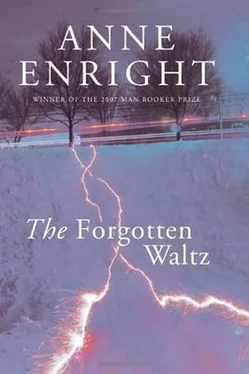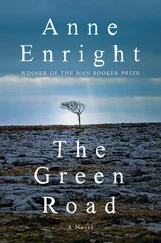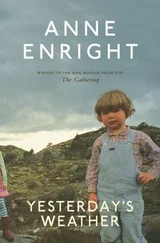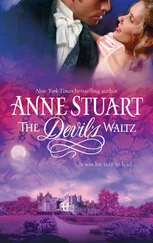‘You were very like yourself, actually.’
‘What age was I?’
‘Four or five.’
She looks out the window.
‘There’s videos,’ she says. ‘But we have the wrong charger.’
‘You were super-cute.’
‘Was I? I think the videos were for the doctor mostly.’
‘Well, everyone was very worried about you, sweetie.’
I have an urge to kiss her, just where her black hair gives way, and the skin of her ear shades into the skin of her cheek.
I ask her does she remember being sick and she says that she does, though I don’t know if this can be true – she was, after all, only four. She says, ‘I had this horrible feeling in my stomach, like I had done something wrong, and then, Bam. I used to think a giant stomped on my head. But just before, just a second before, it was really nice. It was like, “Here it comes. Here comes the foot.” ’
‘You must have got it from “fit”. Here comes the “fit”.’
She is silent.
‘We don’t say “fit”,’ she says. ‘We say “seizure”.’
‘Yes of course,’ I say (because you have to be so polite with children). ‘I’m sorry.’
‘But I didn’t do anything wrong.’
‘No of course you didn’t.’
‘I mean it made me so cross. I wet my pants and everything.’ ‘Finish up your drink, there. We’ll go.’
She holds the paper cup in two mittened hands and drinks, leaving a shallow V of chocolate flaring from her upper lip. She watches me, over the edge of the cup. She says, ‘What’s “Gina” short for?’
‘Nothing. My mother just liked it.’
‘It’s nice.’
‘Thank you.’
Evie will be all right, I think. Despite everything. Despite all our best efforts, you might say, the child has come good.
We go out on to the street and look up at a dark sky, sifting snow.
‘Will we take a cab?’ I say. ‘For the hell of it.’ But Evie says, ‘My Dad isn’t back at the house yet.’
‘Where do you want to go?’
‘Well, I don’t know.’
‘Let’s walk for a while. You want to walk?’
I take her backpack and we head up to Stephen’s Green. We go in a side gate and start to cross the park, aiming for the bus stop on Earlsfort Terrace. We don’t talk much. Evie slides along on the soles of her boots in a way that would annoy me, if I were her mother, but it does not annoy me much.
I go through the darkening town with Seán’s beautiful mistake. Because it really was a mistake for Seán to have a child, and it was a particular mistake for him to have this child; a girl who looks out on the world with his grey eyes, from a mind that is entirely her own. Lovers can be replaced, I think – a little bitterly – but not children. Whoever she turns out to be, he is forever stuck with loving Evie.
I think I love her myself, a little.
Her phone beeps and I know it is him, landed at last. It takes her an age to set her bag down and unpack it to find the phone, and read his text. (I wait for my phone to jump but it does not.)
‘He’ll be, like, forty minutes,’ she says. The snow will melt, the houses will sell – one house, or the other – and Evie will grow or be otherwise lost to me. Not that I ever had her, really. But whether her father stays with me or goes, I will lose this girl.
I say, ‘I know it’s hard about your parents, Evie.’ She does not reply.
‘I just think, it was going to happen one way or another. I mean it could have been anyone, you know?’ She slides on; one scraping step after the other. ‘But it wasn’t,’ she says. I can’t quite see her face. ‘It was you.’
MANY THANKS TO Geraldine Dunne of Brainwave, the Irish Epilepsy Association, and to my old friend, Aideen Tarpey, now with the NHS, for chat and information about epilepsy in children: all errors of fact or emphasis are, of course, my own.
Thanks to Lia Mills for reading early chapters and cheering me on.
Thanks to everyone at Rogers, Coleridge and White, to the people at Random House and, as ever, to my agent Gill Coleridge and to Robin Robertson, my editor these many years.

***















